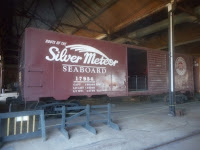The Georgia State Railroad Museum is located in the Savannah roundhouse, or what's left of it. The museum has a medium-sized collection of railroad equipment, almost all from the immediate area, and is well worth a visit. The site itself is very historic; much of it dates to before the Civil War. About half of the roundhouse was demolished when service stopped, but the other half provides an interesting place for the display of the equipment. The site is not connected to the outside world and has little trackage, but they make good use of what's available.
One of the most interesting pieces is this wooden coach, built by the Central of Georgia in 1878, and later used as an inspection car for the officials. It has been preserved in excellent condition.
This Melbourne car belongs to the city and is stored here pending some sort of heritage streetcar line being put into operation.
The original shops covered a lot of territory.
Public operation uses this coach built on a flatcar. Motive power alternates between a saddle-tanker and an industrial Diesel, and we seem to have chosen the wrong month to visit. But as part of the ride you get to be on the rotating turntable.
This wooden coach was built by the railroad in 1911. It was used as an office for many years and is in poor shape, but restoration work is proceeding slowly, and it's still a very interesting artifact.
I talked to a few of the guys working there. Brad remembers meeting me at the last ARM convention held at IRM, so I got to examine the interior of the car. Here he's pointing out what has been done recently to stabilize the structure.
An original window shade, partially preserved.
The C of G shops had their own special decal, which served as a builder's plate.
There are two partitions within the car, and it's not clear why. This one has the more intricate woodwork and is probably original to 1911.
The other one may have been added later. This could have been either to provide a smoking section or had something to do with the Jim Crow seating.
Here we are on the excursion car as the turntable rotates.
The train backs up a few hundred feet to the end of track.
Then we return, and are switched onto a line that leads into the old car shop.
There are remains of foundations all over the place.
The Savannah Children's Museum also occupies part of the site; this is what's left of the carpenter shop.
Inside the car shop are some nicely repainted freight cars.
And two Birney bodies in rather decrepit condition.
You don't want the brick walls falling onto visitors. That would be awkward.
There is also a large model railroad display, evidently operated by a motion detector. Instead of setting off an alarm, the train starts up for a minute or two.
The layout even includes a model of the museum itself. Sitting on the turntable are the Diesel and the excursion car we saw outside.
The Civil War is never far away in Georgia:
But I'm pretty sure this necktie is a repro. The rail is much too big for the Civil War era and has signal bonds at both ends....
Anyway, the museum is well organized and has several interesting displays, and does a good job of explaining how the site originally functioned. It's highly recommended if you're in the area.








































4 comments:
That Melbourne car has really been bastardized, the traction motors have been removed and they installed a diesel engine with a belt driven power axle. Yuck!! I was at a APTA conference one time and some guy gave a presentation on the modifications that were done to the car.
Randy Anderson
Kenansville NC
The Melbourne car was used in an urban waterfront trolley, on an old industrial track on River Street. Not surprisingly, this urban heritage trolley did not live a super long life in service, and was retired in 2015. It is sad that so many downtown heritage trolleys don't make it beyond about 15 years of life. I wonder what would have happened if Jane Byrne actually got IRM's 460 to run to Navy Pier?
-O. Anderson
Thanks, Olin. River Street in Savannah is a neat place, and it reminded us of Bourbon Street in New Orleans. I kept wishing a streetcar would roll by, instead of those stupid rubber-tired "trolleys" you see everywhere. Maybe I'll include a picture or two of River Street in my next post.
Post a Comment